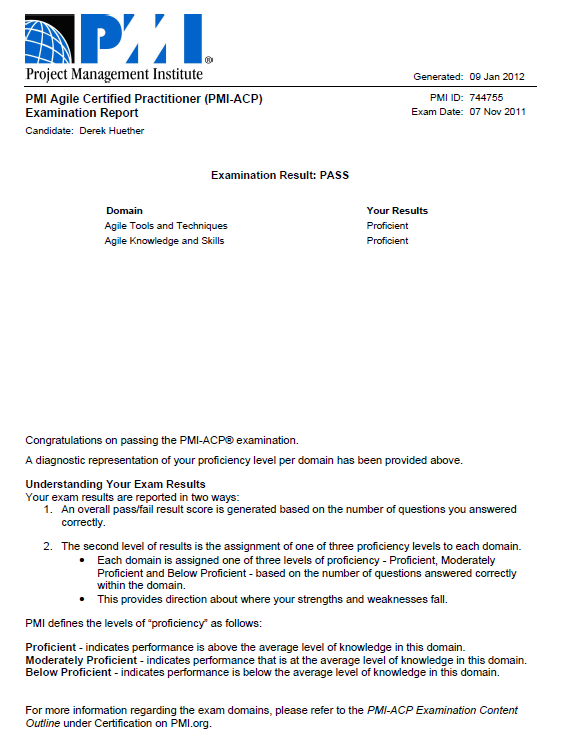With the PMI Agile Certified Practitioner (ACP) exam celebrating its first month in the wild, I am sure you are already seeing a lot of study aids and prep courses being offered. Full disclosure, I do offer ACP prep courses and I also offer PMI Agile Exam flashcards. Wait, did you read that correctly? Yes, you did. I want to ensure there is a source of relevant study material available to the masses so I created the PMI Agile Flashcards website and have an iPhone app (that needs to be submitted to Apple for approval). As a co-lead for the PMI ACP support team, we are tasked with creating a knowledge base of relevant information for the ACP exam. Think of it as a Wikipedia for the PMI-ACP but within the PMI.org website. Though that's all well and good, creating a glossary for both trainers and certification aspirants is not a study aid. I still see the need for things like study guides and exam prep tools. I think back when I was preparing for the PMP. Reading the PMBOK Guide was a wealth of information but I needed something to put it into context. It wasn't until I read Rita Mulcahey's book that it all made sense to me. I also created a deck of flashcards for myself to help me prepare for the PMP exam.
Fast forward to today, for those of you who are looking for a study guide for the ACP, Mike Griffiths (the other PMI ACP support team co-lead) has just completed his ACP Exam prep book. I am releasing my Minimum Viable Product (MVP) for my PMI ACP Exam Flashcards. If that combination worked for me to prepare for the PMP, I hope it works for you for the ACP.
If you are wondering what I mean by MVP, I got the term from the Eric Ries book The Lean Startup. I knew that I needed to get something out there now, get feedback from customers, and iterate the product. The good news is, I know the questions and answers on the flashcards are relevant to the exam. All I needed was to get something out there that people could use.
My MVP
1. The first 75 flashcards loaded
I have loaded 75 flashcards into the database. I know they are all relevant because I took (and passed) the ACP exam and because I have been involved during the certification development and am now involved to support it. I've been involved in the Agile and PMI communities for a while now. I want good quality prep materials made available to people. I don't want them to just pass the exam. I want them to learn something.
2. All flashcards map to one of the six domains
Value Driven Delivery
Stakeholder Engagement
Boosting Team Performance Practices
Adaptive Planning
Problem Detection and Resolution
Continuous Improvement (Product, Process, People)
3. All flashcards map to the two areas you will be graded on
Tools and Techniques
Knowledge and Skills
4. 20 free flashcards to view without login
I figure you'll know if this product has value for you within 20 flashcards. After that, you'll probably want to create a login so you can keep track of your progress.
5. 20 free flashcards with progress tracking with login
So, you created a free account. You'll now be able to visualize your progress as you go. By navigating to the progress screen, you'll be able to navigate back to cards that you got incorrect or skipped earlier. Since you're still using a free account, you'll have access to 20 flashcards.
6. Access to all flashcards with paid account
This is where we wrap it all together. The goal is to have a few hundred flashcards in the system. You can get started now with the first 75. As the database grows, random flashcards will appear as "unviewed". Just check your status before you begin and you know where you stand.
What is next?
Add more flashcards
Make some changes in the User Interface to make it easier to navigate
Get feedback from customers
Refine the product or pivot
Get the iOS and Android versions completed
Note: A few of the links are Amazon affiliate links.








